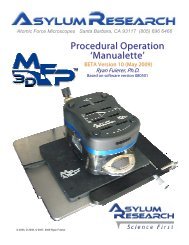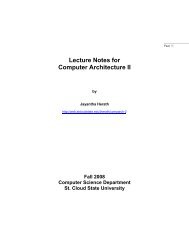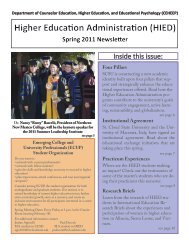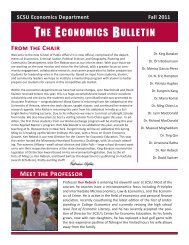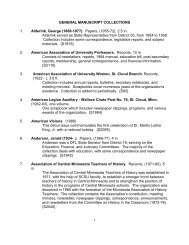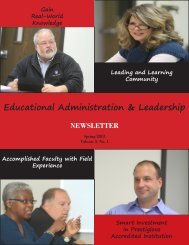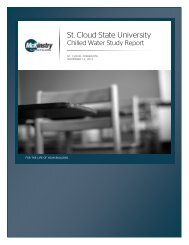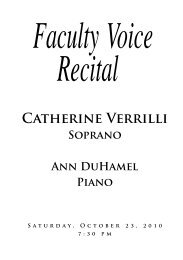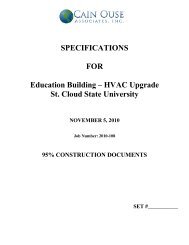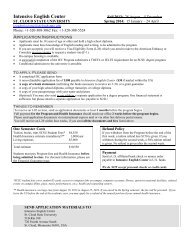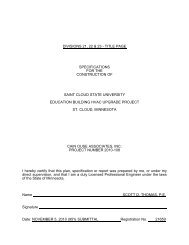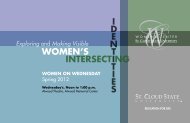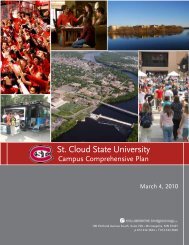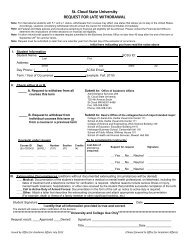2008 Proceedings - St. Cloud State University
2008 Proceedings - St. Cloud State University
2008 Proceedings - St. Cloud State University
Create successful ePaper yourself
Turn your PDF publications into a flip-book with our unique Google optimized e-Paper software.
Abstracts<br />
Session D Humanities North Voyageurs<br />
Effective Peer Review Groups: A Writing Center Approach<br />
Many college composition instructors use peer review groups and peer review sessions as a component of their student-centered, socialconstructivist<br />
pedagogy. Scholars such as Trimbur, Weiner, Bruffee, and Lunsford all seem to agree that peer review sessions should<br />
foster a collaborative arena where students work together to question and challenge peer assumptions and ideas, which should lead to<br />
clearer and more refined articulations. Peer review sessions should ultimately impact not only the student whose paper is being reviewed,<br />
but also the student reviewer who is being called upon to share and revisit his or her own expertise. Unfortunately, this is not the<br />
experience many instructors who use peer review groups and sessions have. These instructors, therefore, are unable to justify devoting<br />
much class-time to peer review with the little knowledge students gain, and so instructors limit or stop using peer review practices<br />
altogether. How can instructors ensure time devoted to peer review groups and sessions benefit students rather than watch students<br />
bestow unwarranted praise on classmates or complete worksheets with no conversation during this class-time? In this presentation, I will<br />
share findings from a three semester study on student and instructor perceptions of traditional and writing center orientated peer review<br />
groups that I completed for my M.A. thesis. Through this study, I have found peer review sessions more beneficial to student writers and<br />
reviewers when writing center practices are implemented. I will use a power point slideshow and handouts to detail and share my findings<br />
and methods.<br />
Presentation Index: D1<br />
Time: 9:30 a.m.<br />
Department: English<br />
Project Sponsor(s):<br />
<strong>St</strong>udent Presenter(s): Timp-Pilon, Michele<br />
Mohrbacher, Carol<br />
Regarding Davidson's "What Metaphors Mean"<br />
Analyzing why Davidson believes grammar does not determine meaning, and in the course of doing this we will look closely at metaphors.<br />
Presentation Index: D2<br />
Time: 9:50 a.m.<br />
Department: Philosophy<br />
Project Sponsor(s):<br />
<strong>St</strong>udent Presenter(s): Kohman, Josh<br />
Nuccetelli, Susana<br />
ESL Creative Writers: Motivation, Process and Product<br />
Writing is hard work. Any writing, if done well, requires thought, organization, revision, and practice. This includes creative writing such as<br />
poetry, fiction, and memoir. English as a Second Language (ESL) writers face unique challenges in an academic setting. College ESL<br />
students are under pressure to achieve near-native writing skills—expressing ideas with clarity and conciseness as well as with<br />
grammatical and syntactical accuracy. In this study, data was examined for insights into the motivation, process, and product of ESL<br />
creative writers. The majority of data was collected from two students—one an ESL student and one a Native English (NE) student—that<br />
included surveys, interviews, and creative work. Text produced was collected at various stages of writing (rough draft, revision, final draft)<br />
and analyzed. Other ESL creative writers were surveyed and interviewed and creative writing teachers were also interviewed regarding<br />
their teaching and evaluating of ESL creative writing. The analysis focused on three questions. What motivates ESL writers to write<br />
creatively in a second language? What processes do ESL writers use in their approach to creative writing in English? What is the quality of<br />
creative writing produced by ESL writers? Although no broad conclusions can be drawn, it is hoped that the information gained can lead to<br />
increased understanding of ESL creative writers so that educators can formulate better strategies in teaching and evaluating creative<br />
writing.<br />
Presentation Index: D3<br />
Time: 10:10 a.m.<br />
Department: English;<br />
Project Sponsor(s):<br />
<strong>St</strong>udent Presenter(s): Deuser, Cindy<br />
Robinson, James<br />
<strong>St</strong>. <strong>Cloud</strong> <strong>St</strong>ate <strong>University</strong> <strong>St</strong>udent Research Colloquium 38<br />
April 22, <strong>2008</strong>



